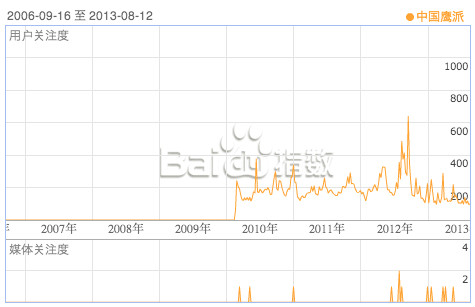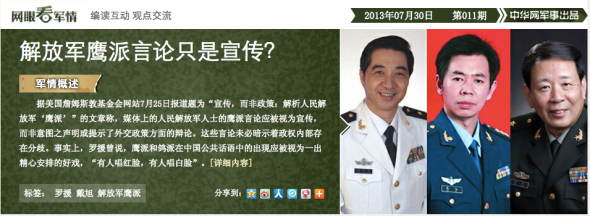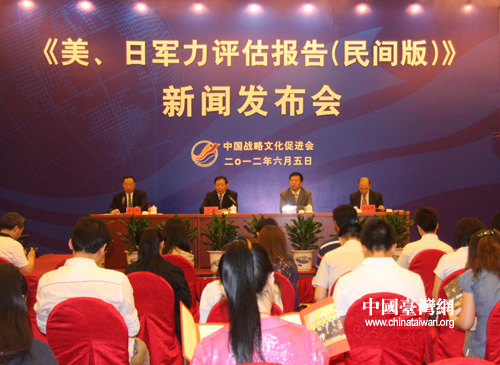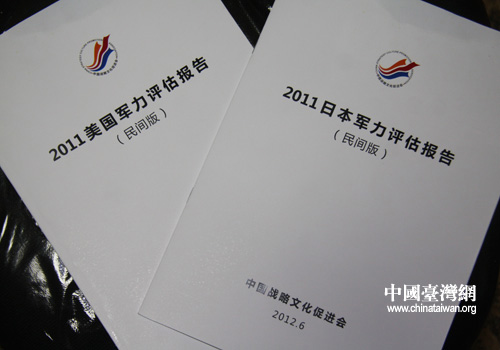Posted: December 5, 2013 | Author: Andrew Chubb | Filed under: Academic debates, Fake PLA generals?, Ministry of Foreign Affairs, PLA & PLAN | Tags: CCP-PLA, Chinese military, Chinese public opinion, civil-military relations, 罗援, Dai Xu, external propaganda, external propaganda experts, Fravel, General Liu Yuan, Han Xudong, hawkish faction, hawkish generals, Justine Zheng Ren, Liu Yawei, Liu Yazhou, Liu Yuan, military propaganda, National Defense Education, National Defense University, PLA hardliners, PLA hawks, political warfare, public opinion warfare, Swaine, Yawei Liu, Yellow Sea, 刘亚洲, 国防教育, 忧患意识, 戴旭 |

Dr Yawei Liu, of the Carter Center
[Updated 17 Dec: As with most things on here, this was bashed out hastily in the not-so-early hours of a morning, so i’ve taken the liberty of revising and adding some bits as i read through it two weeks later. In particular i felt the need to add in the various things i agree with from Liu and Ren’s excellent article, in addition to the criticisms i made.]
~
In an upcoming Journal of Contemporary China article addressing the always fascinating question of PLA officers’ belligerent media statements, Yawei Liu and Justine Zheng Ren advance exactly the opposite case to the one made here earlier this year. They argue that military commentators’ media statements represent the “consensus” voice of the PLA, fighting to influence the CCP’s foreign policy.
Dr Liu, who directs the Carter Center’s China Program, happens to be the brother of General Liu Yazhou, most recently of Silent Contest fame. General Liu himself even features in the article, but references to his thinking are indirect (“General Liu seems to share the conviction that…”), presumably meaning that the two brothers have not talked over these work-related issues. Still, if anyone is in a position to knock the teeth out of my “propaganda, not policy” argument, Dr Liu should be the man.
To briefly recap, my argument was that, based on the backgrounds and affiliations of the main “hawks”, the belligerent military voices in the Chinese media are largely those of nominated propaganda/publicity experts (the two terms conflated as 宣传), whose job is to mould a positive image of the PLA among the domestic population and augment the military’s capabilities by shaping international audiences’ perceptions.[1]
Read the rest of this entry »
Posted: August 13, 2013 | Author: Andrew Chubb | Filed under: Academic debates, Diaoyu, Fake PLA generals?, Global Times, Ministry of Foreign Affairs, PLA & PLAN, South China Sea, State media | Tags: Baidu Index, China-Philippines relations, Chinese foreign policy, Chinese media, Chinese military, Chinese nationalism, Chinese public opinion, 环球网, 环球时报, 罗援, Dai Xu, deterrence, Diaoyu, Diaoyu Islands, 钓鱼岛, 鹰派, 黄岩岛, Global Times, informatized warfare, Jamestown Foundation, Luo Yuan, military propaganda, PLA hawks, propaganda, scarborough shoal, Senkaku, Senkaku Islands, Sino-Japanese relations, south china sea, 忧患意识, 戴旭 |

Here is Part 2 on the PLA hawkish faction from China Brief, with added links to sources, and a couple of graphs from the utterly awesome Baidu Index (big hat tip to Kaiser Kuo).
I’d also like to add my thanks to Xuan Cheng, John Garnaut, James Barker, Mark Stokes and Taylor Fravel for discussions and tips on this topic. They don’t necessarily agree with the content of the article.
~
Publication: China Brief Volume: 13 Issue: 16
August 9, 2013
By: Andrew Chubb

Rise of the hawks: searches for “China hawkish faction” by logged-in Baidu users since 2008. I’m requesting further info from Baidu regarding the extremely low pre-2010 numbers. One point that can be made with confidence is that user interest in the “Chinese hawkish faction” peaked during the Scarborough Shoal and (especially) Diaoyu Islands crises.
If outspoken Chinese military officers are, as Part One suggested, neither irrelevant loudmouths, nor factional warriors, nor yet the voice of the People’s Liberation Army (PLA) on foreign policy, and are instead experts in the PLA-CCP propaganda system, then what might explain the bad publicity they often generate for China? This article explores how the activities of China’s military hawks may contribute to the regime’s domestic and international goals. On a general level, the very appearance of a hawkish faction—the “opera” that Luo Yuan has described—serves the domestic purposes of promoting national unity (Global Times, May 4). By amplifying threat awareness and countering perceived Western plots to permeate the psyche of the Chinese populace and army, the “hawks” direct public dissatisfaction with the policy status quo away from the system as a whole.
In specific crises, such as the standoff at Scarborough Shoal last year or in the wake of the Diaoyu Islands purchase, hard-line remarks from uniformed commentators serve to rally domestic public opinion behind the prospect of military action, instil confidence in the PLA’s willingness to fight over the issue and deter China’s adversary. By amplifying the possibility of otherwise irrational Chinese military action and inevitable escalation should Beijing’s actions be interfered with, they have contributed to a thus-far successful effort to convince the Philippines and Japan to accept the new status quo around Scarborough Shoal and the Diaoyu Islands.
Read the rest of this entry »
Posted: August 1, 2013 | Author: Andrew Chubb | Filed under: Academic debates, Comment threads, Fake PLA generals?, Global Times, PLA & PLAN, Weibo | Tags: Chinese internet, Chinese military, Chinese nationalism, Chinese news portals, 环球网, 环球时报, 罗援, Dai Xu, external propaganda experts, 舆论战, 鹰派, Global Times, hawkish faction, hawkish generals, Huanqiu, military propaganda, Netease, PLA hawks, PRC news portals, propaganda, public opinion warfare, Sohu, 张召忠, 戴旭 |

China.com special topic: Are the PLA’s hawkish statements just propaganda?
In my first foray into mainland China’s propaganda system since winning a “second-class prize” in a television language competition heavily rigged in my favour, the previous post (written for the Jamestown Foundation’s China Brief) was picked up by mainland online media on Tuesday, and run under headlines including:
I apologize in advance for the infelicitousness of this post, but i am a student and this is a blog, so can’t take these things too seriously 😉
My personal favourite headline was:
‘America: Dai Xu more provocative than Luo Yuan, gets some kind of authorization!‘ (China.com).
Since i now speak for “America” (or is it that i am America?), it is high time i actually went there.
Read the rest of this entry »
Posted: July 29, 2013 | Author: Andrew Chubb | Filed under: Academic debates, Diaoyu, Global Times, PLA & PLAN, PLA Daily, TV | Tags: CCTV, China Brief, Chinese foreign policy, Chinese military, civil-military relations, 罗援, 罗援少将, Dai Xu, Diaoyu Islands, external propaganda experts, Han Xudong, hawkish faction, Jamestown Foundation, Luo Yuan, military political work, military propaganda, Peng Guangqian, PLA hawks, PLA-CCP relations, propaganda, south china sea, Susan Shirk, Wang Jisi, Yin Zhuo, Zhang Zhaozhong, 军事对外宣传, 军事政治工作, 外宣, 尹卓, 张召忠, 彭光谦, 戴旭 |

Latest Jamestown China Brief piece, with links to sources:
~
Propaganda, Not Policy: Explaining the PLA’s “Hawkish Faction” (Part One)
By Andrew Chubb
The regular appearance in the Chinese media of People’s Liberation Army (PLA) figures calling for aggressive foreign policy causes controversy and confusion among foreign observers. The most sensational remarks usually are made by academics at PLA institutions. Foreign media routinely pick up sensational quotes from these military officers—such as Major General Luo Yuan’s repeated suggestion for declaring the Diaoyu Islands a Chinese military target range or Rear Admiral Zhang Zhaozhong’s recent call for a blockade of Philippine outposts in the Spratly Islands (Beijing TV/Huanqiu Wang, May 27)—and attribute them to senior military leaders, as their ranks seem to suggest (New York Times, August 20, 2012; TIME, Februrary 20; Tea Leaf Nation, February 25; South China Morning Post, March 6; Reuters, March 17). Operational commanders, however, seldom comment in public on policy issues. Prominent foreign policy analyst Wang Jisi has publicly complained about “reckless statements, made with no official authorization” which had “created a great deal of confusion” (Asian Wall Street Journal, July 1, 2012). In April, recently-retired deputy military region commander Wang Hongguang wrote military pundits had “misled the audience” and caused “interference with our high-level policy decision-making and deployments” (Global Times, April 20). This two-part series assesses who these outspoken PLA officers represent and the implications of their hawkish statements through an evaluation of their backgrounds, affiliations and statements on their work.
Debate about belligerent public remarks from military personnel often surrounds the extent to which they might represent the voice of hawkish PLA constituencies, pressuring the leadership to adopt more aggressive policies. Some analysts tend to dismiss such bluster as largely irrelevant on the basis that military media pundits have no operational military authority, despite their high rank. Others, however, emphasize how continued outspokenness by military figures presupposes high-level party or military support, and that they thus give voice to behind-the-scenes political struggles. A third view proposes that the hawks are the voice of the PLA as an institution, pushing the military’s policy preferences [1]. Analysis of scattered biographical information on the most prominent hawkish PLA media commentators, plus comments regarding their own work, suggests each perspective is partially right. None is a general in a conventional military sense, yet they are far from irrelevant. Their backgrounds, affiliations and positions, however, indicate their role probably has more to do with the regime’s domestic and international propaganda work objectives than political debates.
Read the rest of this entry »
Posted: July 20, 2013 | Author: Andrew Chubb | Filed under: PLA & PLAN, Weibo | Tags: China Strategy Culture Promotion Association, Chinese army propaganda, 罗援, 罗援少将, Dai Xu, external propaganda, 龙韬, Long Tao, Luo Yuan, PLA, PLA political work, propaganda, Taiwan Affairs Office, Weibo, 戴旭, 中国战略文化促进会 |

Press conference launching China Strategy Culture Promotion Association’s 中国战略文化促进会 2011 reports on US and Japanese military developments
Here is an actual weblog post — a log of what one reads on the internet — rather than the usual rambling speculative essay.
Luo Yuan’s think tank, the “China Strategy Culture Promotion Association” (中国战略文化促进会), yesterday released separate reports on the “military power of the US and Japan”.
Curiously, given it’s supposedly an non-governmental think tank (民间智库), the Global Times quoted China Foreign Affairs University’s Su Hao calling the reports “strong and timely responses to the inaccurate remarks in the US annual report on China’s military and the Japanese Ministry of Defense’s recent white paper” (emphasis added).
The report has been given lots of coverage in the Chinese-language media. Chinese radio bulletins yesterday were reporting on the report before it was even released.
The radio also mentioned that this year’s reports will be issued in English. I hope this is true, because it looks to be packed with highlights:
The reports pointed out that neither the US nor Japan had enough transparency regarding their military budgets.
[…]
The report concluded that Japan has strengthened its defense in its southwest islands and was preparing to take over the Diaoyu Islands by force in the future and intervening in any potential conflict in the Taiwan Straits.
Luo Yuan himself was quoted:
“We need to prepare for the worst [situation],” Luo said, adding that China should be well equipped.
This is the second year the think tank has released these reports. Copies of last year’s report carried the term “public version 民间版” on the cover, as pictured at the top, which seems to suggest there also exists some kind of restricted-circulation government version. If so, the China Strategy Culture Promotion Association looks like a good analogue of Luo Yuan’s own roles, at the intersection of military intelligence gathering, public diplomacy, propaganda work, and Taiwan affairs.

2011 U.S. Military Power Assessment and 2011 Japan Military Power Assessment reports
Note the watermark on the above pictures, which are taken from the think tank’s own website here. Chinataiwan.org is a website of the PRC State Council Taiwan Affairs Office, which Luo Yuan’s father Luo Qingchang directed in the 1970s and early 1980s.
* * *
I stumbled across a couple of rather astonishing little Dai Xu tidbits a couple of weeks back.
1.) According to China Intellectual Property News, Dai Xu sued a Hong Kong magazine Wide Angle Lens《广角镜》 and others including a Beijing airport newsagent, for lifting 52% of the 2011 Long Tao article calling for a South China Sea war. He demanded withdrawal of the magazine from circulation, apologies, compensation of ¥200,000. Judgement was handed down in January this year. He was awarded……wait for it…….¥240.
Among other things, i guess this shows Colonel Dai is not that well-connected.
2.) A sharp-witted blogger has outed Dai Xu for writing a preface, under his penname “Long Tao”, to his own chapters, in a book edited by him. Of one Dai Xu chapter, “Long Tao” asserts that “this piece can be called the modern-day Strategies of the Warring States 《战国策》” and that “Dai Xu has continued his consistent style of speaking the truth . . . on national strategy, Dai Xu’s viewpoint is deafeningly clear, and manifestly superior”. In the other self-preface, Long Tao says the following article “will receive the support of the majority of Chinese people and Chinese military personnel . . . an incomparably correct position . . . nobody has ever explained important theoretical problems so clearly, correctly, reasonably and vividly”.

Preface to brilliant Dai Xu chapter, written by Dai Xu
Here we see essentially the same self-wumao tactic as Luo Yuan got caught employing on weibo a few months back. A post appeared on Luo’s weibo account, praising Luo Yuan’s superb analysis of the North Korean problem, and declaring him “the most popular military commentator on television”.
The Major General claimed he claimed his account had been hacked, but Kai-fu Lee certainly wasn’t buying it. He did, however, offer Luo some expert advice: “Although you can use different browsers to operate multiple weibo accounts, the premise is that each browser must be logged into a different account!”

Luo Yuan’s enthusiastic weibo post in praise of…Luo Yuan. Screenshots from Kai-fu Lee’s weibo
Posted: May 3, 2012 | Author: Andrew Chubb | Filed under: PLA & PLAN, State media, TV | Tags: Chinese Academy of Military Science, Chinese foreign policy, Chinese media, Chinese military, 罗青长, 罗援, international bargaining, Luo Qingchang, Luo Yuan, media sensationalism, PLA & PLAN, PRC foreign policy, south china sea, Southern Weekend, Susan Shirk, Zhang Zhaozhong, 南风窗 |

Luo Yuan at the CPPCC meeting in Beijing, March 2012
Translating the following profile on Luo Yuan led to an extremely stimulating discussion with a Chinese friend last night on the topic of this so-called “Major-General”. My friend sees the Luo Yuan media phenomenon as serving an important purpose for the central government: Luo basically acts as a layer of interference between the decision-makers and outside observers.
Among the various possibilities raised in the previous article on Luo Yuan, then, this explanation implies that his prominence in the media is very much a result of consensus at the top of both the military and the party that it is beneficial to have a hardline attack dog. The logic is strong: official-ish voices, those of like Luo and other hawkish paramilitary figures such as Major-General Zhang Zhaozhong of National Defense University, add a layer of unpredictability to Chinese foreign policy, a la North Korea’s antics.
My friend dismisses the idea that Luo Yuan could represent any kind of policy faction or alliance within the party or military; Luo has no influence of his own, he argues, and no genuine policy player would agree with him. The implication of this is that no-one in a position of power in China would actually want to act aggressively on the South China Sea issue. The players in the decision-making process, whoever they are, including military leaders, are much too rational to entertain such ideas.
The bigger picture that starts to take shape is one in which the China Threat Theory is actually something that the Chinese government wants, and perhaps even needs, in order to hide its soft underbelly.
Although the party-state’s approach to the South China Sea disputes is often publicly criticised in China as weak-kneed, my friend places this approach among the government’s continuous, long-term policies that are not subject to internal competition or debate. We can certainly discern a pattern of opportunism in China’s actual actions in the South China Sea, from the taking of the Paracels from South Vietnamese remnants in 1974, to the 1988 battle with Vietnam over the Union Atolls in the Spratlys as Vietnam’s backer the Soviet Union began to crumble, to the occupation of Mischief Reef in 1995 in the wake of the US’s departure from the Philippines.
However, the question might be asked: if China is so rational on the South China Sea issue, why did it alienate its neighbours and draw the US in by stepping up its presence in 2009-2011? Well, Michael Swaine & M. Taylor Fravel have shown, convincingly in my view, that China’s alleged assertiveness, or aggressiveness (or even “aggressive assertiveness“!) during that period was largely explainable as a series of responses to the actions of rival claimant states, mainly Vietnam and the Philippines.
That still leaves the question of Luo Yuan as an opinion leader in Chinese society. My friend’s reading of the situation suggests that the CCP is so confident of its control of domestic nationalist opinion that it doesn’t feel like it’s playing with fire at all when it allows mass outpourings of support for Luo and criticism of the policy status quo online. This confidence was especially apparent in July last year when China agreed to the Guidelines for the Implementation of the South China Sea DOC, inevitably causing nationalist outrage online.
Regarding the popular online support for Luo’s views, my friend puts this down to simple venting. Indeed, the article translated below suggests that the Chinese people just want to see someone in the military express hardline views, and want to believe that someone in power agrees with them. Nevertheless, he sees the allowing or facilitating of Luo Yuan’s media profile as primarily an externally-directed tactic.
So perhaps the CCP trusts that the public, on the whole, really doesn’t agree with Luo’s standpoints. I will be testing this idea through some offline opinion polling later this year – a likely finding of little support for stronger action in the South China Sea among everyday people, would support this conclusion. (This would be exactly the opposite of prominent US scholar Susan Shirk’s claim that the leadership feels threatened by a madly nationalistic public.) After all, a tiny fraction of the population can make a lot of noise online, as many of the South Sea conversations documented here illustrate.
So in sum, Luo Yuan’s media presence, and the provocative media coverage of the Scarborough Shoal standoff that i mused about here last week, could all be part of the same strategy of disinformation for the outside world: let guys like Luo Yuan rant, let the Chinese media make him seem credible, and let the internet users provide “evidence” that the Chinese people are angry about the South Sea and demanding tougher actions, when in fact they are apathetic, and tougher actions are not on the policy agenda.
This is basically a full inversion of the idea of China’s domestic situation dictating China’s foreign policy; instead, the domestic situation is being manipulated and used to China’s advantage at the international negotiating table. It suggests a broader and deeper application of the principles of the “strategic logic of anti-foreign protest” – aka the nationalism card.
The following profile on Luo Yuan, from the April 9 edition of Southern Window, gives the impression of an angry, impotent, and even confused Luo Yuan fighting an unwinnable battle against China’s moral decay. And despite his princeling background, he doesn’t appear to particularly well connected either.
Note: the translation is a summary one in some parts, but mostly it is sentence-by-sentence.
Luo Yuan the “hawk”
Zhang Jianfeng, Southern Weekend
The writer likens the courtyard at the Chinese Academy of Military Science to a “freeze-frame” scene. Luo Yuan sums up the peace and quiet as the site of “a battle without smoke, and a place for pre-practice of war, of concealed dragons and crouching tigers”. Some people deride the Chinese Academy of Military Science as being on the sideilnes, but Luo Yuan quotes a Deng Tuo poem on the ability of writers to cause bloodshed.
Read the rest of this entry »









“Public opinion warfare to smear military commentators”: my plot to contain China exposed
Posted: August 1, 2013 | Author: Andrew Chubb | Filed under: Academic debates, Comment threads, Fake PLA generals?, Global Times, PLA & PLAN, Weibo | Tags: Chinese internet, Chinese military, Chinese nationalism, Chinese news portals, 环球网, 环球时报, 罗援, Dai Xu, external propaganda experts, 舆论战, 鹰派, Global Times, hawkish faction, hawkish generals, Huanqiu, military propaganda, Netease, PLA hawks, PRC news portals, propaganda, public opinion warfare, Sohu, 张召忠, 戴旭 | 6 CommentsChina.com special topic: Are the PLA’s hawkish statements just propaganda?
In my first foray into mainland China’s propaganda system since winning a “second-class prize” in a television language competition heavily rigged in my favour, the previous post (written for the Jamestown Foundation’s China Brief) was picked up by mainland online media on Tuesday, and run under headlines including:
I apologize in advance for the infelicitousness of this post, but i am a student and this is a blog, so can’t take these things too seriously 😉
My personal favourite headline was:
Since i now speak for “America” (or is it that i am America?), it is high time i actually went there.
Read the rest of this entry »